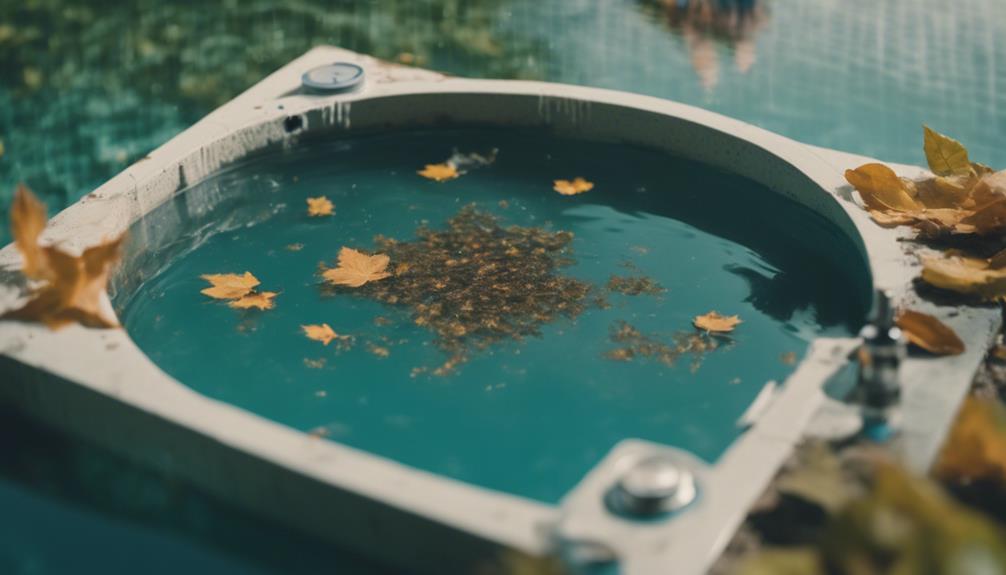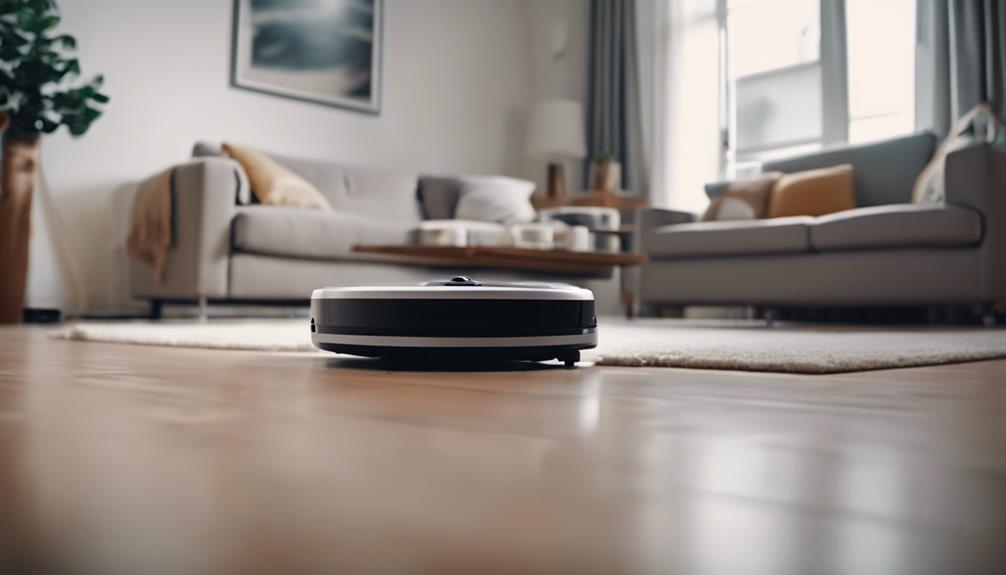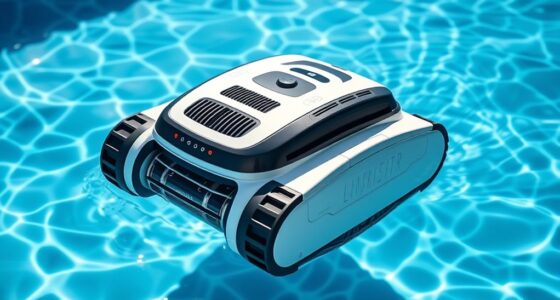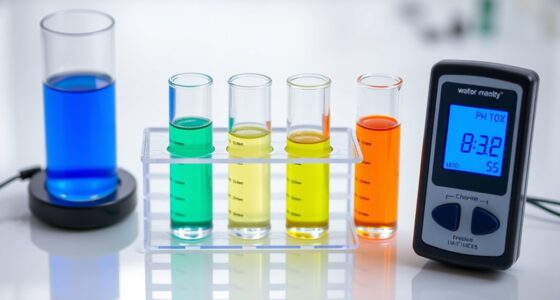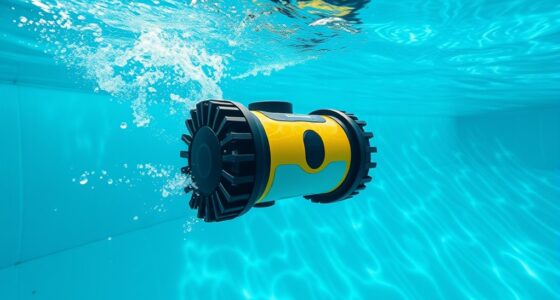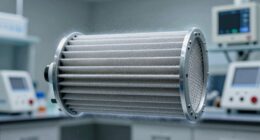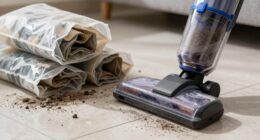To easily maintain your new pool, optimize water circulation, establish a regular cleaning schedule, balance water chemistry, take care of the pool interior, and ensure proper shock maintenance. Choose a variable speed pool pump, select the right pool heater, and consider the filter type. Utilize robotic pool cleaners for efficient cleaning. These essential tips are crucial for new pool owners to keep your pool clean and safe for swimming. Implementing these suggestions will make pool maintenance a seamless process. Further information on each aspect will give you a comprehensive understanding of proper pool upkeep.
Key Takeaways
- Establish a regular cleaning schedule to maintain water clarity.
- Test and balance chemicals weekly for safe swimming conditions.
- Invest in quality cleaning tools for efficient maintenance.
- Keep an eye on water chemistry balance for optimal pool health.
- Consider using a robotic pool cleaner for automated and thorough cleaning.
Pool Water Circulation
To maintain a healthy pool environment, make sure efficient water circulation by optimizing your pool pump and filter settings regularly. Proper water circulation in your pool is crucial for distributing chemicals evenly, preventing algae growth, and maintaining water clarity.
An effective pool circulation system includes skimmers, drains, and returns that work together to keep the water moving continuously, aiding in best filtration and sanitation. This circulation also helps filter out debris, maintain consistent water temperature, and prevent stagnant areas in the pool.
Inadequate water circulation can lead to issues such as chemical imbalances, cloudy water, and poor distribution of heat throughout the pool. By ensuring that your pool pump and filtration system are in good working order and properly adjusted, you can promote efficient water circulation, which is essential for the overall maintenance and health of your pool.
Regular Cleaning Schedule
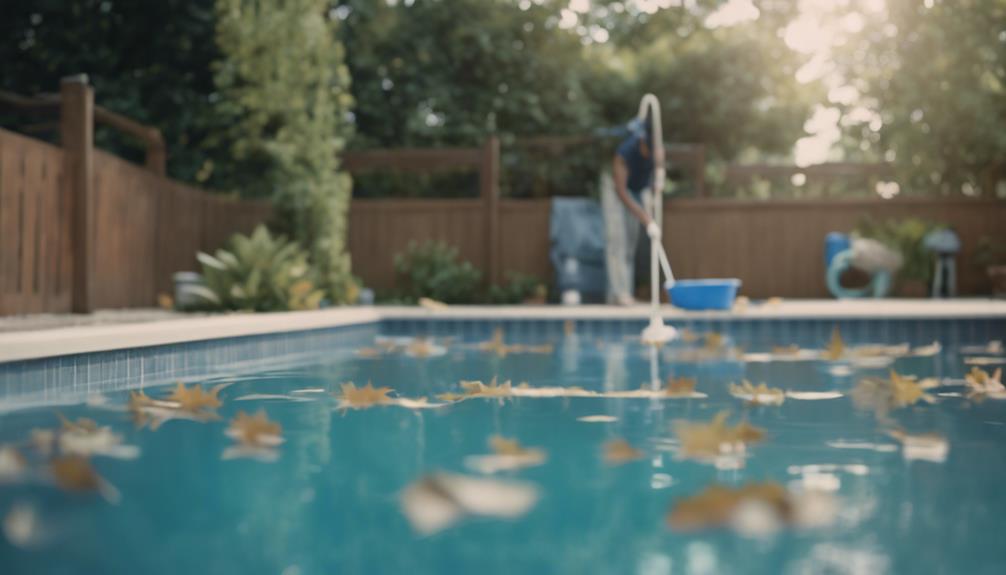
To maintain your pool's cleanliness, it's essential to establish a regular cleaning schedule. This includes:
- Brushing and skimming the pool twice a week to prevent debris buildup.
- Vacuuming it once a week to remove dirt and particles.
Additionally, testing and balancing pool water chemicals weekly is vital for a safe and clean swimming environment.
Cleaning Tools Selection
Selecting the right cleaning tools is crucial for maintaining a regular cleaning schedule to keep your pool in top condition. Having the proper equipment makes pool maintenance more efficient and helps prevent common issues like algae growth. Below is a table outlining the essential cleaning tools for your pool:
| Cleaning Tools | Description |
|---|---|
| Telescopic Pole | Allows you to reach all areas of the pool easily |
| Brush Attachment | Helps scrub off dirt and algae from pool walls |
| Skimmer Attachment | Used for removing leaves and debris from the water |
| Pool Vacuum | Cleans the pool floor and removes debris |
These tools are important for your pool maintenance routine. Remember, investing in quality tools and following a consistent cleaning schedule not only keeps your pool water clear but also extends the lifespan of your pool equipment.
Weekly Skimming Routine
How frequently should you skim your pool to guarantee excellent water clarity and filtration efficiency? Implementing a weekly skimming routine is essential for maintaining a clean pool surface.
By skimming at least twice a week, you can remove leaves, insects, and debris that may compromise water clarity and filtration efficiency. Regular skimming prevents debris from sinking to the pool bottom, reducing the need for extensive cleaning.
This routine not only keeps the pool inviting for swimmers but also promotes ideal water circulation and filtration. Consistent skimming sessions play an important role in preventing clogs in the filtration system and minimizing the risk of algae growth.
Filter Maintenance Importance
Implementing a regular cleaning schedule for your pool filters is essential to maintaining efficient filtration and water clarity. Cleaning filters help prevent clogs that can lead to poor water circulation, algae growth, and equipment damage.
It's vital to follow the manufacturer's recommendations for cleaning filters to guarantee peak performance. Neglecting filter maintenance can result in increased energy consumption and costly repairs.
By keeping your filters clean, you remove debris, dirt, and contaminants from the pool water, promoting a healthy swimming environment. Remember that clogged filters not only affect water clarity but also impact the overall efficiency of your pool system.
Regularly cleaning your pool filters won't only save you money in the long run but also ensure that your pool operates smoothly and effectively. Make filter maintenance a priority to avoid unnecessary issues and to enjoy crystal-clear water all season long.
Water Chemistry Balance
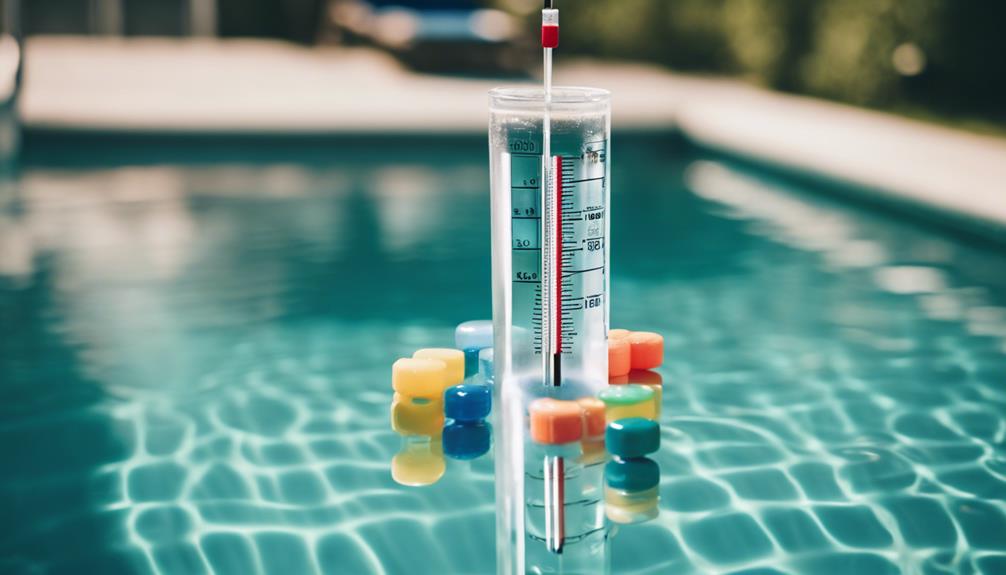
Maintain proper water chemistry balance in your pool by regularly testing and adjusting alkalinity, pH, chlorine, and calcium hardness levels within recommended ranges. Keeping these in check is essential for a safe and enjoyable swimming experience. Here's a guide to help you understand the importance of each element:
| Element | Recommended Range | Purpose |
|---|---|---|
| Alkalinity Levels | 80-120 ppm | Prevents pH fluctuations and maintains water balance |
| pH Levels | 7.4-7.6 | Prevents corrosion, scale formation, and ensures comfort |
| Chlorine Levels | 1-3 ppm | Disinfects water and prevents algae growth |
Regularly testing your pool water for these levels will help you maintain the chemical balance necessary for a healthy pool environment. Remember, proper water balance not only keeps your pool sparkling but also protects swimmers and equipment.
Interior Care Tips
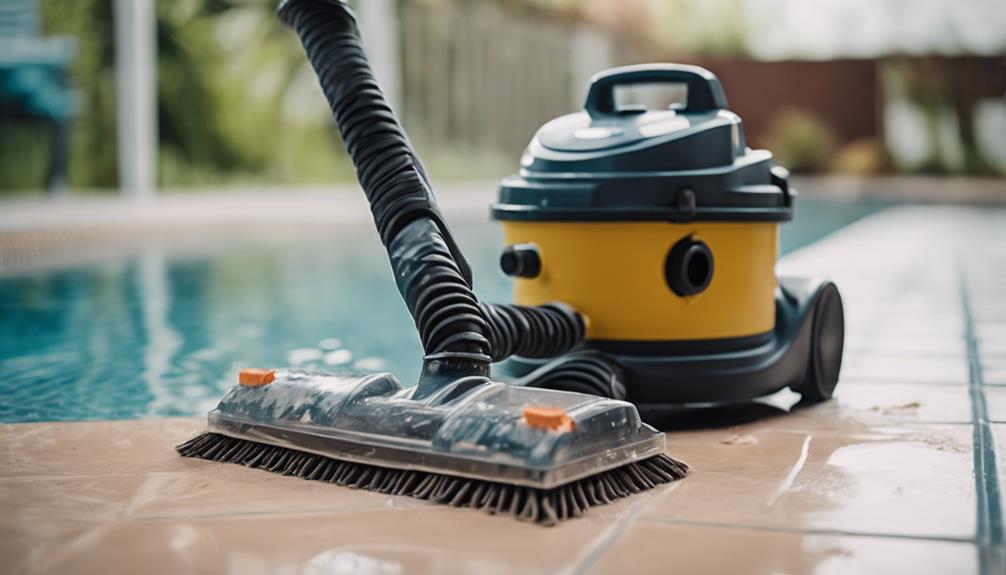
To maintain your pool in top condition, remember to regularly brush and clean the walls to prevent algae and mold growth.
Utilize a pool vacuum for efficient removal of debris and dirt from the floor and corners.
Additionally, make sure the pool liner is well-maintained to avoid leaks and damage.
Tile Cleaning Techniques
Regularly cleaning your pool tiles with a non-abrasive tile cleaner is crucial to prevent the buildup of dirt, grime, and calcium deposits. Use a pool brush or scrubbing pad to gently scrub the tiles and remove any stubborn stains or algae growth.
Consider using a tile and vinyl cleaner specifically designed for pool surfaces to maintain the shine and cleanliness of the tiles. Avoid using harsh chemicals or abrasive tools that can damage the tile surface and grout, leading to costly repairs.
Proper tile maintenance enhances the overall aesthetic appeal of the pool and contributes to a clean and inviting swimming environment. Remember to focus on the grout between the tiles as well, as neglecting it can lead to mold and mildew growth.
Preventing Algae Growth
Preventing algae growth in your pool is vital to maintain a clean and inviting swimming environment. Algae can cause green, slimy walls and cloudy water, affecting both the appearance and hygiene of your pool.
To prevent this, make sure proper circulation and filtration of the water. Regularly brush and scrub the pool walls to prevent algae buildup. Maintaining the chemical balance in your pool water is essential; use algaecides and shock treatments as preventive measures to combat algae effectively.
Consistent cleaning, including skimming, vacuuming, and water testing, is key to preventing algae growth and keeping your pool sparkling clean. By staying on top of swimming pool maintenance tasks and following these tips, you can enjoy a clear and algae-free pool all season long.
Balancing Water Chemistry
Maintaining a proper balance of water chemistry in your pool is essential for ensuring a safe and enjoyable swimming experience. Balancing alkalinity, pH levels, and chlorine levels is crucial to prevent issues like algae growth, skin irritation, and cloudy water. Regularly testing your pool water using test kits allows you to adjust chemicals to recommended levels, keeping your pool clean and clear. Improperly balanced water chemistry can lead to algae blooms, which not only affect water clarity but also require more extensive cleaning and maintenance. Moreover, unbalanced pH levels can cause skin and eye irritation, making swimming uncomfortable. By staying on top of your pool's water chemistry, you can enjoy a sparkling clean pool while minimizing the risk of health hazards and equipment damage.
| Water Chemistry | Importance | Effects |
|---|---|---|
| Balancing Alkalinity | Prevents pH fluctuations | Maintains water clarity |
| pH Levels | Affects chlorine efficacy | Prevents skin irritation |
| Chlorine Levels | Kills bacteria and algae | Ensures safe swimming water |
Proper Shock Maintenance
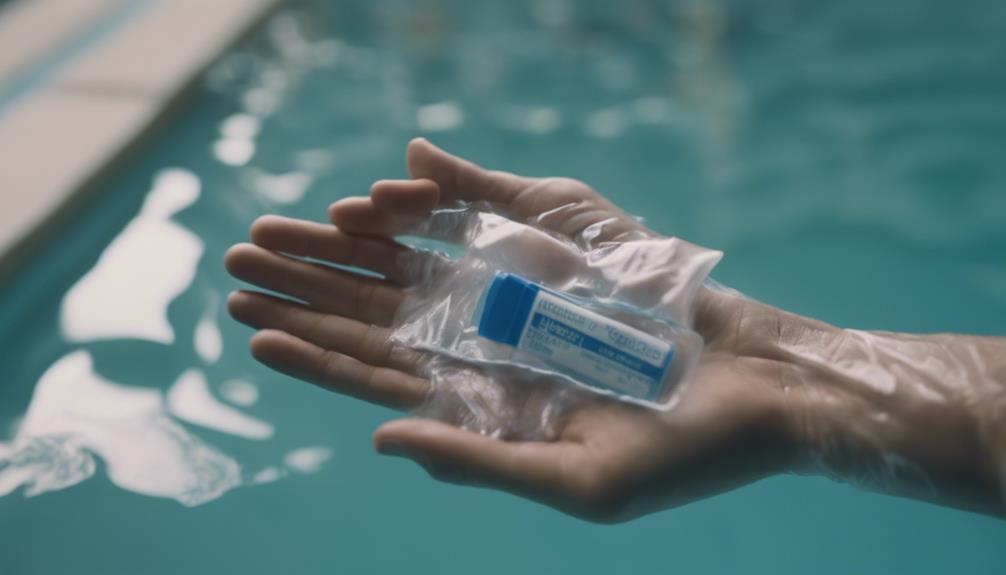
To effectively maintain your pool's water clarity and sanitation, make sure to shock your pool after heavy usage or rainstorms. Shocking helps prevent algae growth, kills bacteria, and oxidizes contaminants in the water.
After adding shock, run your pool pump for at least 8 hours to make certain the shock is evenly distributed. Remember that sunlight can degrade shock, so plan your maintenance routine accordingly.
Consistent shock maintenance is vital for a clean and safe swimming environment for you and your family. By following a proper shock schedule, you can enjoy crystal-clear water and peace of mind knowing that your pool is well-sanitized.
Prioritize shock maintenance to keep your pool in top condition and to maximize your swimming pleasure.
Organizing Maintenance Tasks
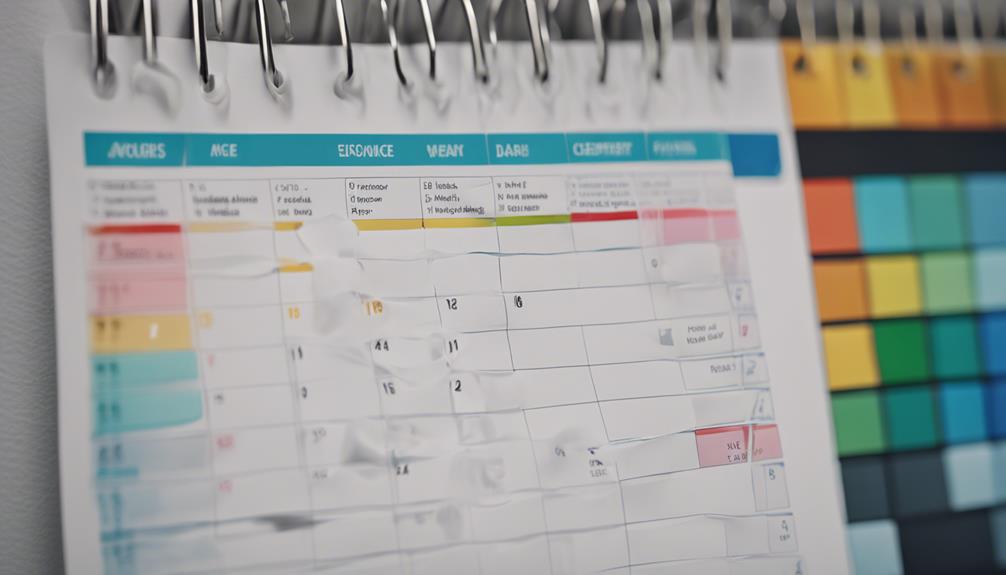
To effectively organize your pool maintenance tasks, create a weekly schedule that designates specific days for skimming, vacuuming, and water chemistry testing.
Assigning tasks to certain days guarantees regular upkeep and helps prevent neglecting any aspect of pool care.
Utilize a maintenance checklist to track completed tasks and consider investing in automation systems for streamlined upkeep.
Task Scheduling Tips
How can you effectively organize your pool maintenance tasks for best care and efficiency?
To guarantee your pool stays clean and safe, create a weekly maintenance schedule. Assign specific days for tasks like brushing, skimming, vacuuming, and water testing. This way, you can ensure thorough and consistent pool care.
It's beneficial to use a pool maintenance checklist to track completed tasks and keep an eye on upcoming maintenance needs. Consider utilizing a pool maintenance app or setting calendar reminders to help you remember scheduled tasks.
Equipment Maintenance Guide
Create a detailed maintenance schedule outlining tasks like cleaning pool equipment, checking for leaks, and servicing filters to guarantee peak performance. Organize maintenance tasks based on frequency, such as weekly skimming, monthly filter cleaning, and annual equipment servicing.
Implement a system to track maintenance tasks, guaranteeing you stay on top of upkeep and prevent costly repairs. Prioritize equipment maintenance according to usage and manufacturer recommendations to extend the lifespan of pool components.
Regularly inspect pool equipment for wear and tear, leaks, or malfunctions to address issues promptly and maintain efficient pool operation. By following a structured maintenance schedule and keeping track of maintenance tasks, you can ensure that your pool equipment functions at its best, reducing the risk of unexpected breakdowns and maximizing the enjoyment of your pool.
Regular maintenance is key to a smoothly running pool system and can save you time and money in the long run.
Cleaning Supplies Checklist
Consider putting together a thorough cleaning supplies checklist to streamline your pool maintenance tasks effectively. As a new pool owner, having the right tools like a brush attachment and skimmer attachment is essential for efficient pool cleaning. Your cleaning supplies checklist should include essentials such as a pool vacuum for thorough cleaning of the pool floor and walls, a water testing kit to monitor and maintain proper chemical balance in the water, a telescopic pole for reaching distant spots, and brushes for scrubbing.
Organizing maintenance tasks with these tools ensures a systematic approach to pool upkeep. By incorporating a water testing kit, you can easily check the chemical balance and address any issues promptly. With a skimmer attachment, you can remove debris from the surface efficiently. Including these items in your cleaning supplies checklist will make pool maintenance more manageable and help keep your pool water clean and inviting.
Variable Speed Pool Pump
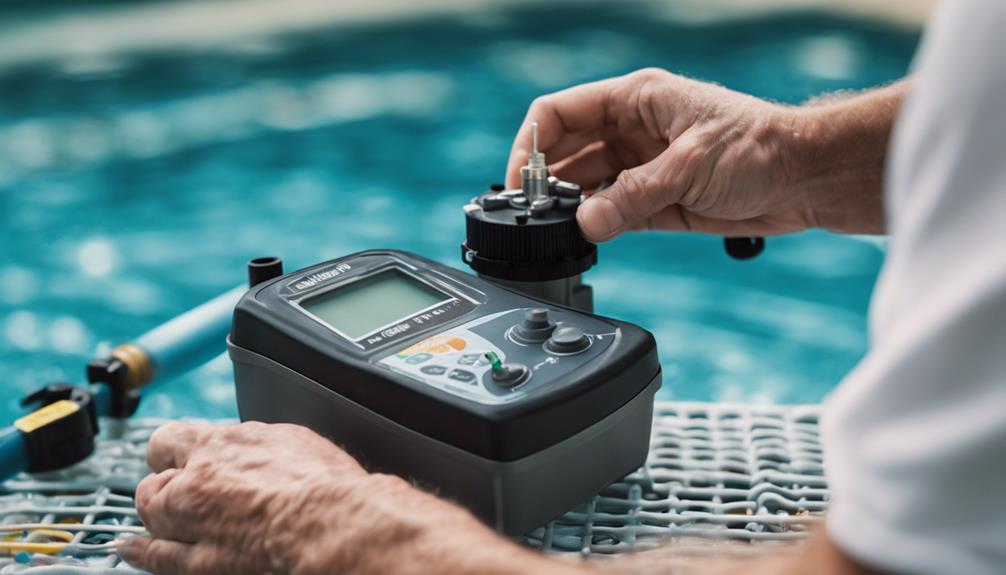
When considering pool maintenance efficiency and cost savings, one essential component new pool owners should prioritize is the installation of a variable speed pool pump.
Variable speed pool pumps offer significant energy savings, up to 90% compared to single-speed pumps. They come with customizable speed settings, allowing you to optimize energy usage based on your pool needs. These pumps operate more efficiently, quietly, and have longer lifespans than traditional pumps.
By adjusting the pump speeds for filtration, heating, and cleaning tasks, you can maximize efficiency and cost savings over time. Investing in a variable speed pool pump not only optimizes your pool needs but also leads to significant savings on energy bills.
Pool Heater Selection
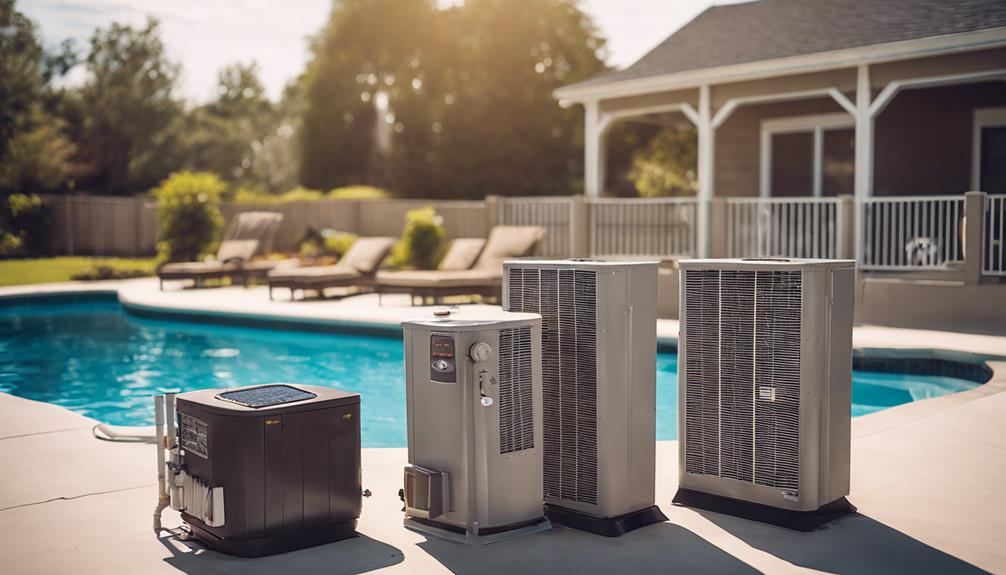
Choosing the correct pool heater is essential in maintaining ideal water temperature and maximizing energy efficiency for your pool. When selecting a pool heater, consider factors like energy efficiency, heating speed, cost-effectiveness, maintenance requirements, and installation. Here is a comparison table to help you make an informed decision:
| Criteria | Heat Pump | Gas Heater |
|---|---|---|
| Criteria | Heat Pump | Gas Heater |
| Energy Efficiency | High (up to 3x more) | Lower |
| Heating Speed | Slower | Faster |
| Cost-effectiveness | Lower operating cost | Higher operating cost |
| Maintenance | Minimal | Regular maintenance |
To meet your specific needs, you may opt for a heat pump for energy efficiency or a gas heater for faster heating. For ideal temperature control, consider combining heating methods like using solar covers with heat pumps or gas heaters. Evaluate the overall cost of operation, maintenance, and installation to determine the most suitable pool heater for your pool.
Filter Type Considerations
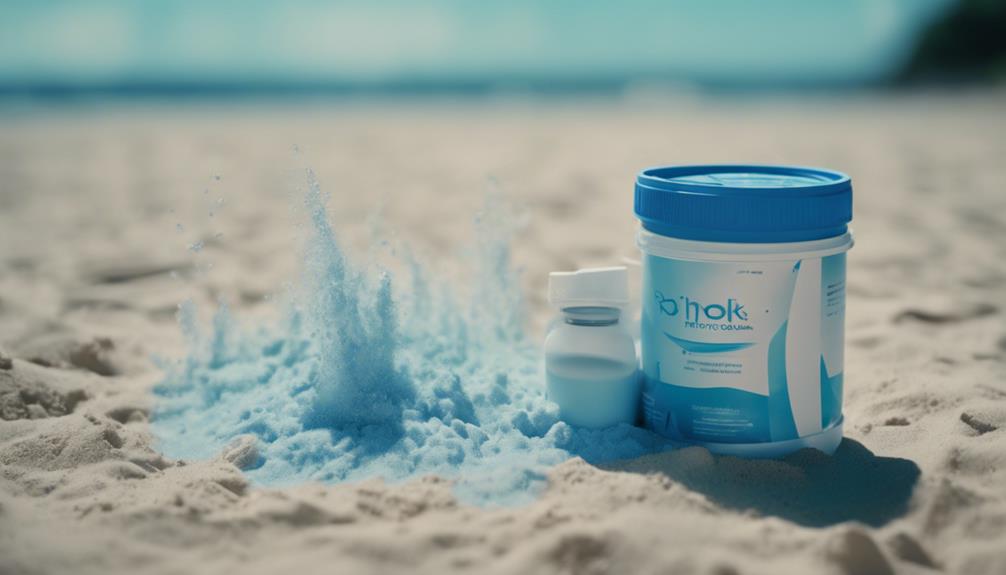
To optimize your pool's filtration system, evaluate the maintenance requirements and filtration efficiency of cartridge, sand, and DE filters when considering the right filter type for your pool.
Here are some key considerations for each type:
- Cartridge filters: Require periodic cleaning by removing and hosing down the cartridge.
- Sand filters: Need backwashing to flush out debris and maintain effectiveness.
- DE filters: Offer the finest filtration but require regular backwashing and recharging for best performance.
Cartridge filters are suitable for smaller pools with lower maintenance needs, while sand filters are ideal for larger pools with moderate maintenance requirements. DE filters provide superior filtration for larger pools but demand more frequent maintenance to ensure excellent performance.
Remember to choose a filter type that aligns with your pool size and maintenance capabilities to keep your pool water clean and inviting.
Robotic Pool Cleaner Usage
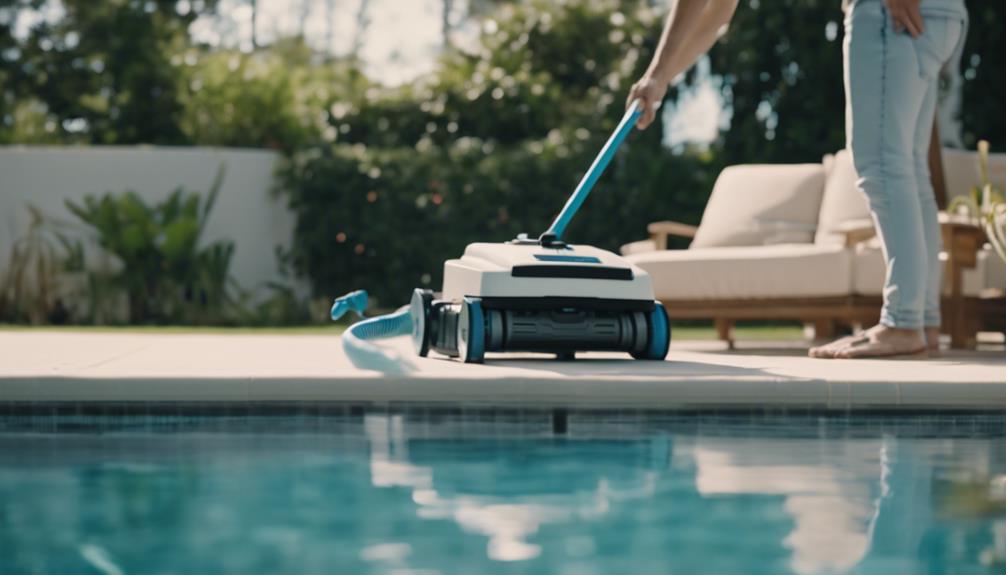
Consider utilizing a robotic pool cleaner to streamline maintenance tasks and keep your pool spotless with minimal effort. Robotic pool cleaners automate scrubbing and vacuuming, making it easier for pool owners to maintain a sparkling clean pool.
These efficient cleaners map out the pool for thorough cleaning, guaranteeing no debris is missed. While the initial investment in a robotic pool cleaner may seem high, it's cost-effective in the long run compared to hiring professional cleaners.
The saved time and effort in manual cleaning tasks make these cleaners worth the investment as they pay for themselves over time. By using a robotic pool cleaner, you can enjoy a debris-free pool and a pristine swimming environment without the hassle of manual scrubbing and vacuuming.
Make pool maintenance more manageable and secure your pool stays crystal clear by incorporating a robotic pool cleaner into your maintenance routine.
Frequently Asked Questions
What Do I Need for a First Time Pool Owner?
You'll need a telescopic pole, brush, skimmer, vacuum, and water testing kit to start as a first-time pool owner. Implement a maintenance schedule with tasks like brushing, skimming, vacuuming, testing chemicals, and servicing equipment.
How Do You Maintain a Pool for Beginners?
Keeping your pool clean and safe is simple. Skim debris, brush walls, vacuum, test water chemistry weekly, and cover the pool. Yearly servicing for equipment and a robotic cleaner can save time and money. You've got this!
What Chemicals Should I Put in My Pool for the First Time?
To start, add chlorine to sanitize and prevent algae growth. Balance pH with increasers or decreasers (7.2-7.6). Stabilize pH with alkalinity increaser. Protect surfaces with calcium hardness increaser. Consider using cyanuric acid to help chlorine stay effective against sunlight.
How Do I Treat My Pool for the First Time?
When treating your pool for the first time, start by checking water chemistry levels. Balance chemicals to create a safe environment. Brush and vacuum for a clear pool. Shock if needed. Monitor regularly for a well-maintained pool experience.
What Are Essential Pool Maintenance Tips for Pet Owners?
Pool maintenance is important for pet owners. To keep the water clean and safe for your pets, regular skimming and vacuuming are essential pet hair care tips. Make sure to check the pool’s chemical balance and invest in a sturdy pool cover to keep your pets safe and the pool clean.
Conclusion
So there you have it, new pool owner! By following these essential maintenance tips, you can guarantee that your pool remains clean, safe, and enjoyable for years to come.
Remember to prioritize water circulation, regular cleaning, and proper chemical balance.
Don't forget about interior care, shock maintenance, and choosing the right pump, heater, filter, and cleaner.
With these tips in mind, you'll be able to enjoy your pool without any added stress or hassle.
Happy swimming!
